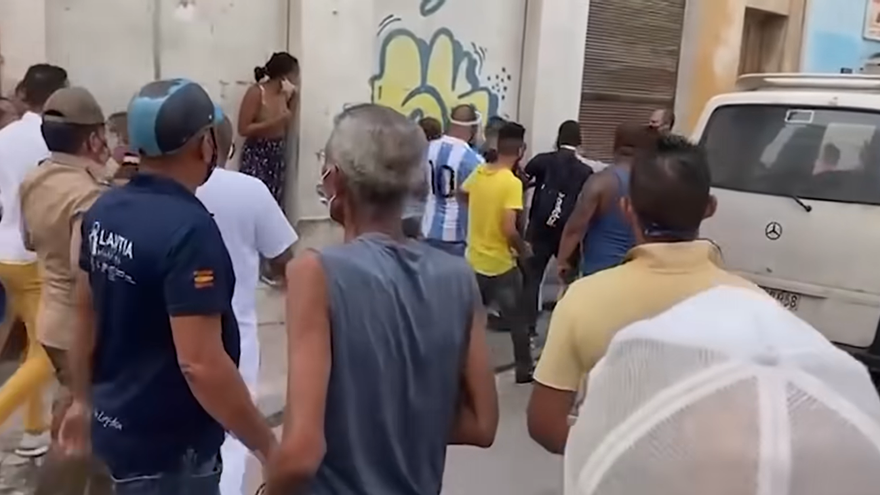
![]() 14ymedio, Havana, 20 October 2021 — The Cuban Government will eliminate “pre-criminal dangerousness,” a legal definition that it has been used for years to imprison opponents. The elimination of this ’crime’ has been demanded by international organizations including Amnesty International and Human Rights Watch.
14ymedio, Havana, 20 October 2021 — The Cuban Government will eliminate “pre-criminal dangerousness,” a legal definition that it has been used for years to imprison opponents. The elimination of this ’crime’ has been demanded by international organizations including Amnesty International and Human Rights Watch.
Rubén Remigio Ferro, president of the People’s Supreme Court, said on Tuesday on the State television program Mesa Redonda [Roundtable] that the measure is excluded in the new Criminal Procedure Law (LPP), which has not yet been approved. “Criminal law only deals with facts that are crimes established in the Penal Code,” he said in this regard.
Until now, this crime has been used as a mechanism to impose penalties before an anticipated future commission of a crime, in the style of the science fiction film Minority Report.
Pre-criminal dangerousness can also be arrived at after receiving several “warning letters,” a wake-up call that is frequently applied against young people who do not have employment, show critical opinions about the Government or, simply, are unlucky enough not to be liked by the Police Sector Chief in their neighborhood.
Among the other legal novelties announced, the magistrate stressed that anyone accused of any crime has the right to have legal assistance “from the very beginning of the process.” That moment occurs when the person is made aware of the charges against him and who is accusing him, something that, on paper, should occur within the first 24 hours of an arrest or within five days if the person is free.
In the event that the defendant pleads guilty to a crime and agrees with the charges and the proposed sanction, a trial may be waived and the court will issue the agreed upon sentence.
The new norm will also establish that no citizen can be deprived of liberty except by the competent authorities, in addition to, the judge assures, “strengthening the presumption of innocence and the right to communicate” with one’s family immediately, common practices in Justice in other countries that are currently not in effect in Cuba and that, at least in theory, should begin to be carried out.
“In the case of the provisional prison measure [pre-trial custody], it is regulated with greater precision regarding when it can be requested. The bill even incorporates judicial control, the option that lawyers have to request the court to review the legitimacy of that provisional detention,” added Ferro.
The law also provides that the victims of a crime are recognized as parties, which gives them rights that until now they did not have, such as being present in the process, appointing lawyers, proposing evidence and claiming compensation.
Ferro explained that the decisions have been made in order to modernize the Cuban Justice and harmonize it with the international treaties Cuba is committed to, and to ensure that the new laws are in accordance with the 2019 Constitution and the guidelines and have the approval of the experts.
Given the triumphalism of Remigio Ferro, and although he did not mention it on national television, in the new norm there are still repressive variables that are arbitrarily applied frequently against opponents, activists and independent journalists, such as home confinement and the prohibition of leaving the country, classified in the new Criminal Procedure Law project as “precautionary measures.”
In addition, the prohibition of leaving the national territory is formalized on paper. This prohibition is popularly referred to as being regulated*, and until now was not in the law, in cases in which the accused is involved in crimes that entail “material reparations or compensation for damages of high amounts”; in acts “of high injury or social repercussion”; in crimes in which “they have caused serious damage to the country’s economy”; and in “any other case in which there are well-founded reasons that they are going to try to leave the national territory to avoid the process.”
The president of the Supreme Court has assured on several occasions since the July 11 protests that judicial procedures are followed in accordance with the law in Cuba, with all the guarantees due under current law. However, associations, such as Human Rights Watch, speaking on Wednesday, said that those detained in the anti-government demonstrations have not only suffered torture and inhuman treatment, but that Justice has not been applied correctly and they have suffered arbitrary detentions and false trials.
This proven fact calls into question the goodwill that may govern the new law, since it is not the first time that the practice of the courts contradicts the words of the Supreme Court.
The Foundation for Human Rights in Cuba added Remigio Ferro to its list of regime repressors in 2019 after the publication of a tweet in which the senior official mentioned the existence of Law 88, also known as the Gag Law, as an instrument to penalize those who “support, facilitate or collaborate with the objectives of [the United States] Helms-Burton Act.”
*Translator’s note: See also these articles.
____________
COLLABORATE WITH OUR WORK: The 14ymedio team is committed to practicing serious journalism that reflects Cuba’s reality in all its depth. Thank you for joining us on this long journey. We invite you to continue supporting us by becoming a member of 14ymedio now. Together we can continue transforming journalism in Cuba.
